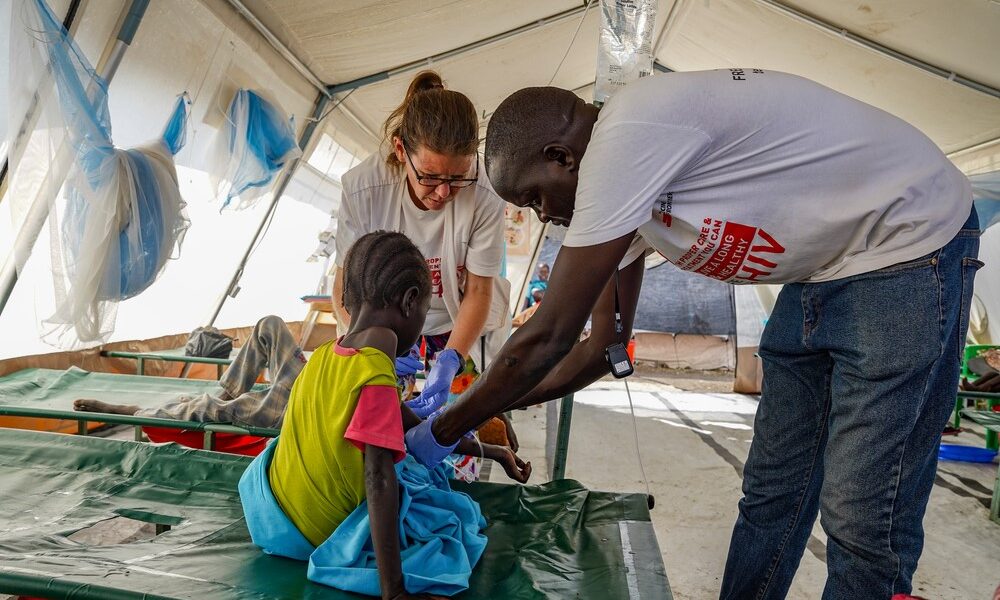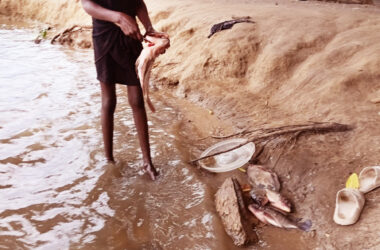By Kei Emmanuel Duku
Médecins Sans Frontières (MSF) has raised an alarm over the increasing cholera cases in Malakal, Upper Nile State, calling for improved and coordinated response to contain the outbreak.
Since the first suspected case was reported on 5 November, the number of people affected has risen significantly, placing an immense strain on the limited response to date.
As of December 3, MSF said a total of 737 cholera cases were reported in Malakal. It added that it is treating 646 patients – more than 87% of all cases, placing immense strain on the limited response plans by health partners.
“The situation in Malakal remains critical, and we are concerned that the outbreak is spreading to neighbouring areas such as Tonga and Kodok. MSF urgently set up the 100-bed cholera treatment centre (CTC) in Assosa and continues to provide critical medical care; however, significant gaps remain, especially in the number of functioning oral rehydration points (ORPs) and water and sanitation,” said Zakaria Mwatia, MSF head of mission in South Sudan. “We have been stretched thin in our response as we have had to expand our efforts to address critical gaps in the ongoing response.”
The outbreak, initially declared in Renk, Upper Nile State, on 28 October 2024, has spread to Malakal, Bentiu in Unity State, Aweil in Northern Bahr-el Ghazal state, and even the capital, Juba, MSF said.
Renk is a major entry point for refugees and returnees from Sudan, and the inadequate living and hygiene conditions have contributed to cholera’s spread.
Over 850,000 people have crossed from Sudan into South Sudan over the past 18 months, around 75% of them through the Renk crossing into Upper Nile State.
The ongoing influx of refugees and returnees into South Sudan continues to pose risks to the already fragile situation and puts additional pressure on an already much overstretched health system. This highlights the urgent need for a stronger response to not only curb the spread of cholera, but also strengthen the delivery of critical health services across the country.
MSF said as of December 3, a total of 1,526 suspected and confirmed cholera cases had been recorded in South Sudan, with the numbers continuing to rise rapidly. Of these, more than 880 were treated at MSF facilities.
Hundreds of these patients are displaced from the neighbouring Sudan, where more than 37,000 cholera cases have been reported in the recent months. More than 70 per cent of the reported cases are in the Upper Nile State alone.
Since October to date, a total of 37,000 cholera cases have been reported in the last month and a half about 283 (70%) are registered in Upper Nile State alone, and already 100 have been treated for the virus.
Zakaria stated that efforts to curb the spread of the virus in Upper Nile State have been slow although MSF has already started conducting community awareness on cholera prevention and transmission, contact tracing, and referral of suspected cases to medical facilities for further management.
Other intervention efforts provided by MSF to the Ministry of Health and other health partners to minimize the spread of the virus include the provision of technical support, medical supplies, and logistical assistance to fill the gap and ensure an effective response in the fight against the disease.
Zakaria further added that mobile teams outside Malakal Town have already been established to provide technical support to the Ministry of Health in setting up cholera treatment units.
South Sudan is currently home to over 850,000 Sudanese refugees who have settled in Renk and other parts of the country following the outbreak of conflict between the Sudan Armed Forces and Repaid Support Forces in the last 18 months.
It is estimated that about 75% of the Sudanese refugees have settled in Renk Town of Upper Nile with the majority of them without basic social services like health drinking water, shelter, and food contributing to the outbreak of cholera.
The MSF Head of Mission in South Sudan noted the continued influx of refugees from Sudan and returnees posed a greater risk to the already fragile health situation in the country and there is a need for additional resources to support the overstretched health sector.
Oral rehydration points (ORPs) are small but critical establishments that provide oral rehydration salts (ORS) and basic treatment for dehydration; however, their establishment has also been slow.
“We urgently call for immediate and substantial scale-up of activities to contain this outbreak especially the provision of Oral rehydration points (ORPs) which is a critical and basic treatment for cholera, the arrival of the vaccines is a commended effort however urgency is needed in accelerating the implementation of a comprehensive cholera vaccination campaign, ensure rapid and equitable coverage” stated Zakaria.
As a measure to contain the spread, MSF has started have equip major health facilities in refugee hosting areas with 20-bed cholera treatment units (CTU) in Renk Civil Hospital in Upper Nile and Gurei Public Health Centre and Gorom refugee camp as well as Maper West in Northern Bahr El Ghazal.
In Bentiu and Rukbona in Unity State, a 10-bed cholera treatment unit (CTU) has been set up and an additional 50-bed cholera treatment center (CTC) in the camp for internally displaced people (IDPs) is due to be established along with a second 10-bed (expandable to 20) CTU in Rubkona town. As of December 3rd a total of 126 cases of cholera has been reported in Bentiu since the first outbreak was confirmed two weeks ago.



